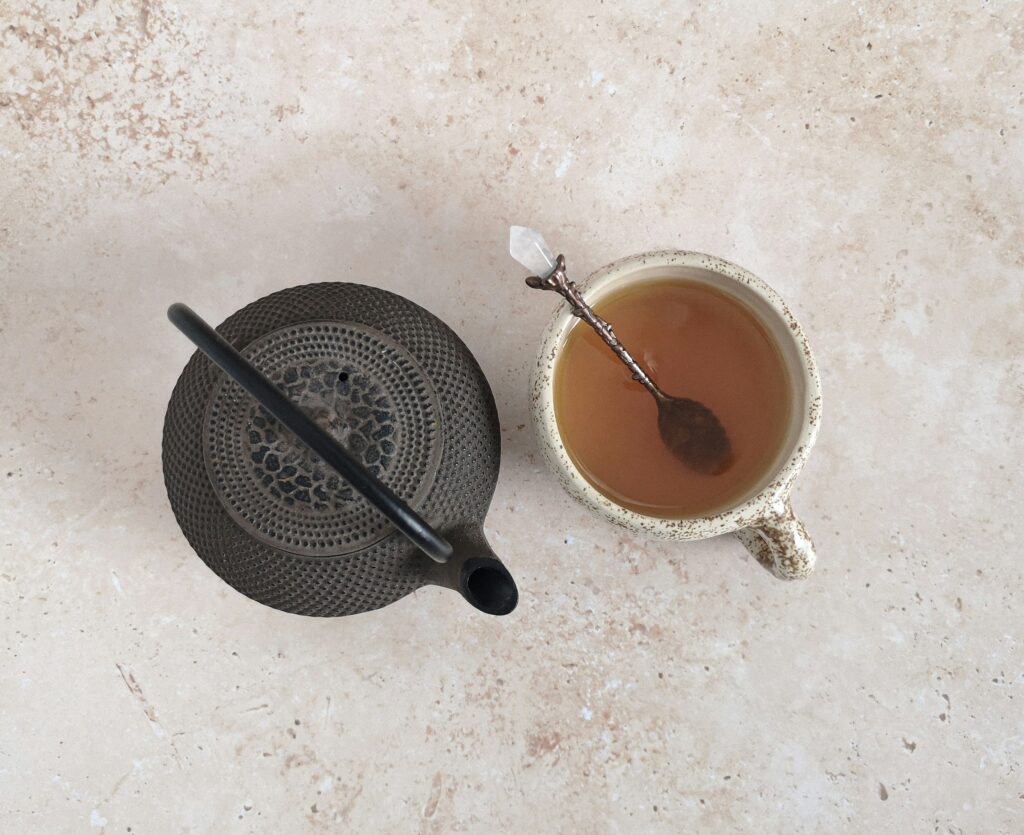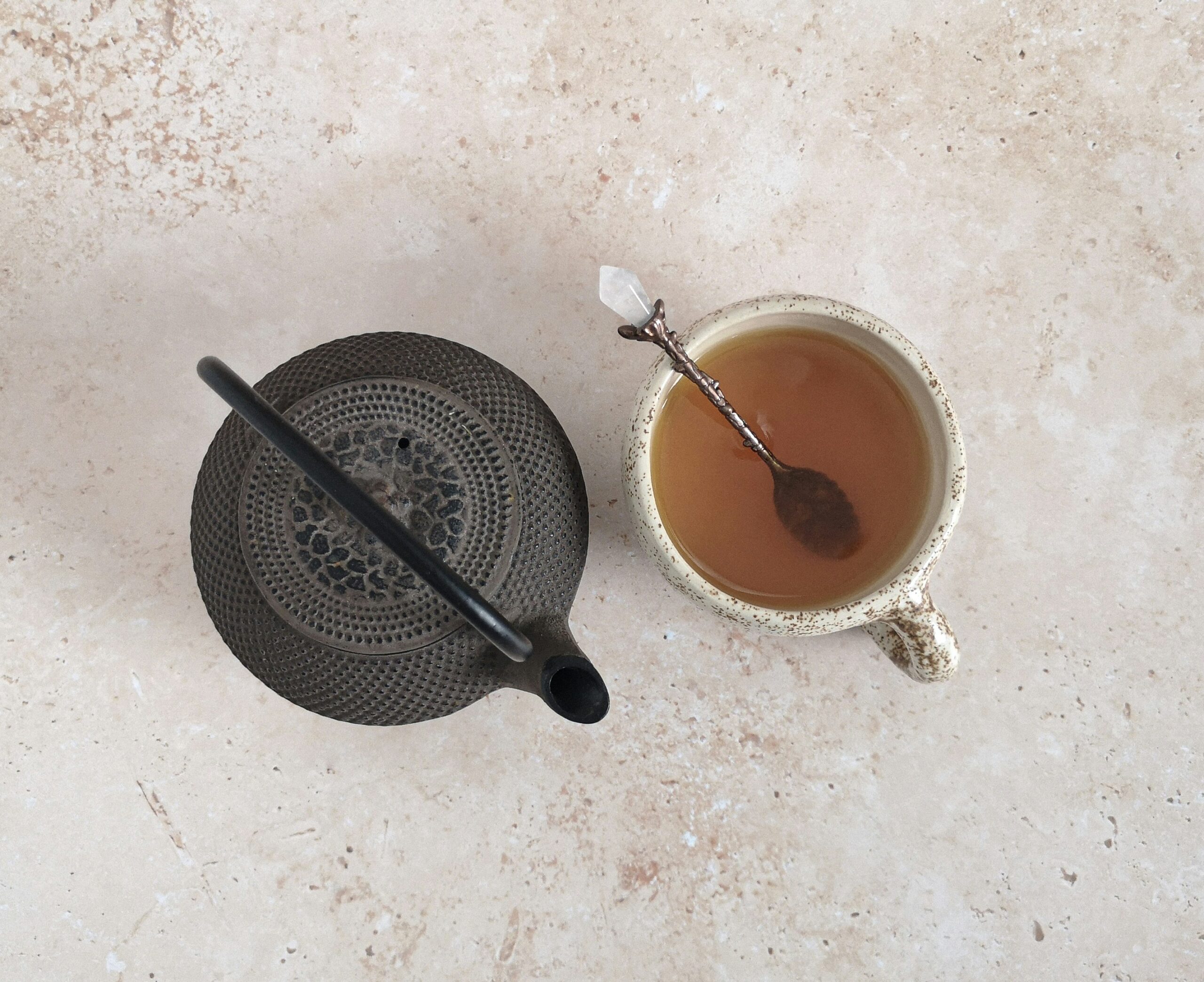
Feeling overwhelmed or stressed is common, and finding simple ways to manage anxiety can make a big difference – lets discover the best herbal tea for anxiety. Sipping on herbal tea is one approach that has gained popularity for promoting calmness and relaxation. Chamomile tea, known for its mild sedative properties, is often recommended for its anxiety-reducing effects. Other herbal teas like ginger and rosemary also show promise in supporting mental health and stress relief.
Drinking the right herbal tea can be a soothing ritual, providing comfort with every cup. While chamomile is well-regarded, experimenting with different options might lead you to discover new favourites. Herbal teas provide not just anxiety relief but also potential physical health benefits, making them a versatile addition to your routine.
As you explore these options, integrating herbal tea into your lifestyle can contribute to a holistic anxiety management plan. Pairing tea with other stress-relief practices may enhance its effectiveness. Whether you’re looking for relaxation at the end of a long day or seeking a natural way to complement your existing mental health practices, herbal teas might just be the gentle solution you need.
Key Takeaways
- Herbal teas like chamomile can aid in managing anxiety.
- Experimenting with various teas can offer both mental and physical benefits.
- Incorporating tea into your routine supports a holistic approach to stress relief.
Understanding Anxiety and Its Impact on Mental Health
Anxiety can influence mental health deeply. It is important to look at different types of anxiety disorders, recognise their symptoms, and understand the effects of chronic stress.
Types of Anxiety Disorders
Anxiety disorders come in various forms, each affecting people differently. Generalised Anxiety Disorder (GAD) involves persistent and excessive worry about many activities or events. Panic Disorder is marked by sudden attacks of intense fear that trigger severe physical reactions like heart palpitations or shortness of breath. Social Anxiety Disorder revolves around overwhelming fear of social judgement or embarrassment in public situations. Phobias are intense fears of specific objects or situations, like heights or spiders. Being aware of these types can help in seeking suitable treatment and improving your mental health. Recognising which form of anxiety you experience is crucial for managing it effectively.
Symptoms of Anxiety
Recognising anxiety symptoms is essential for managing your mental health. Common signs include persistent worry, restlessness, and difficulty concentrating. You might also experience physical symptoms, such as a racing heart, sweating, or trembling. Sleep disturbances, like insomnia, frequently accompany anxiety, adding to mental stress. Chronic anxiety can lead to fatigue and muscle tension, affecting your daily life. Different disorders may present unique symptoms, but these are widely shared among various forms. Documenting and discussing your symptoms with professionals is vital for finding the best treatment options. It is also helpful to track these symptoms to understand their triggers and manage them better in everyday situations.
Effects of Chronic Stress
Chronic stress can significantly impact your mental health and well-being. It may lead to anxiety or depression, reducing mental performance and making daily tasks challenging. Prolonged stress can weaken your immune system, making you more susceptible to illnesses. This can also affect your relationships, leading to tension and misunderstandings. It’s linked to physical health problems like hypertension and cardiovascular diseases as well. Mental fatigue is common, causing difficulty in making decisions or solving problems. Learning to manage stress is crucial for maintaining mental and physical health. Techniques like relaxation exercises, meditation, and regular physical activity can help mitigate the negative effects.
Herbal Teas for Anxiety Relief
Herbal teas can play a valuable role in helping you manage anxiety. Different herbal teas offer various health benefits, from relaxation and stress relief to improved sleep quality.
Chamomile Tea: A Natural Sedative
Chamomile tea is well-known for its calming and sedative effects. It’s often used to help promote relaxation and ease anxiety. The tea contains apigenin, an antioxidant that binds to certain receptors in your brain, leading to a soothing effect.
Drinking chamomile tea before bed might improve your sleep by helping your mind relax. It is widely available and can be easily prepared by steeping dried chamomile flowers in hot water. Regular consumption may contribute to a sense of calm and ease anxiety symptoms.
Green Tea and L-Theanine
Green tea is celebrated for its numerous health benefits, including its anxiety-relieving properties. It contains a unique amino acid called L-theanine, which is known for promoting relaxation without causing drowsiness. L-theanine may help reduce stress and improve your mental focus.
The mild caffeine content in green tea can complement L-theanine, leading to a balanced energy boost. This combination of effects makes green tea a good choice if you are seeking a gentle lift along with a calming influence.
Passionflower Tea for Calming Effects
Passionflower tea is utilised for its calming effects, often recommended for anxiety relief. It increases levels of gamma-aminobutyric acid (GABA) in your brain, helping to lower brain activity and promote relaxation. This can be particularly helpful when you’re feeling stressed.
Drinking a cup of passionflower tea may aid in managing anxiety symptoms and improving sleep. It can be prepared by steeping dried passionflower leaves in boiling water. Regular intake might contribute to your overall sense of calm and reduce anxiety.
Valerian Root: Enhancing Sleep Quality
Valerian root tea is known for its potential in enhancing sleep quality, particularly beneficial if anxiety is affecting your rest. It is often used to combat insomnia and promote deeper sleep. Valerian root works by increasing GABA levels in your brain, which may reduce stress and promote relaxation.
Sipping this tea before bed might help you achieve a restful night. It is prepared by steeping the root in hot water, offering a natural alternative to sleep medications without the risk of dependency.
Lemon Balm Tea for Stress Reduction
Lemon balm tea is a popular choice for reducing stress and anxiety. It’s often recommended for its ability to promote a calm state of mind. The tea is made from the lemon balm plant, which is a member of the mint family.
Drinking lemon balm tea can help to elevate your mood and improve mental clarity. Its mild flavour also makes it an enjoyable beverage to consume throughout the day, contributing to stress relief without side effects.
Lavender Tea: Soothing the Mind
Lavender tea has long been associated with soothing properties that can benefit anxiety relief. It’s widely used for its ability to calm nerves and enhance relaxation. Lavender contains compounds that may help to lower your heart rate and relax tense muscles.
The fragrant aroma and delicate taste of lavender tea add to its calming experience. You can prepare it by steeping dried lavender flowers in hot water to enjoy its therapeutic effects as part of your self-care routine.
Peppermint Tea: More Than a Fresh Flavour
Peppermint tea is not only appreciated for its refreshing flavour but also for its potential calming effects. It’s often consumed to relieve symptoms of anxiety and stress. The menthol in peppermint can help relax muscles, which may indirectly reduce anxiety levels.
While peppermint tea doesn’t contain any caffeine, its soothing qualities can still provide a subtle energising effect. Enjoy this tea as a way to refresh your mind and reduce tension throughout your day.
Potential Health Benefits of Herbal Teas Beyond Anxiety Relief
Herbal teas offer more than just anxiety relief. They provide antioxidants, reduce inflammation, and support digestive health through natural ingredients like ginger and chamomile.
Antioxidants in Herbal Teas
Herbal teas are rich in antioxidants, which help protect your body from damage caused by free radicals. These antioxidants can support overall health and may reduce the risk of certain diseases, including heart disease and some types of cancer.
Green tea and black tea are popular for their antioxidant properties, but herbal teas like chamomile and ginger also contain beneficial compounds. Regular consumption of these teas can help maintain your well-being, giving your immune system an extra boost.
Anti-inflammatory Properties of Herbal Components
Many herbal teas possess anti-inflammatory properties that can contribute to better health. Key ingredients like ginger, licorice root, and chamomile are known for their ability to reduce inflammation in the body.
Inflammation is linked to various health issues, such as heart disease and depression. By incorporating herbal teas with anti-inflammatory effects into your routine, you may lessen discomfort and enhance your body’s natural healing processes.
Herbal Teas and Digestive Health
Herbal teas can greatly improve your digestive health. Ingredients like fennel and ginger are well-known for soothing digestive issues, such as bloating and cramping. Fennel tea, for example, promotes healthy digestion by relaxing muscles in the intestines and relieving gas.
Chamomile is another excellent choice, offering gentle digestive support and helping to relieve stomach discomfort. By drinking these teas regularly, you might find relief for digestive troubles and enjoy a more comfortable day-to-day life.
Adopting a Holistic Approach to Anxiety Management
Taking a holistic approach to managing anxiety involves integrating mindfulness, exercise, and dietary strategies. These methods aim to enhance mental health by promoting balance and reducing stress.
Mindfulness and Meditation Practices
Mindfulness and meditation are powerful tools for anxiety management. By focusing on the present moment, you can reduce stress and improve your mental health. Start with simple breathing exercises to centre your thoughts and calm your mind.
Guided meditation apps can help you establish a routine. Just a few minutes a day can make a difference. Practicing mindfulness does not require special skills; it simply involves paying attention to your thoughts and feelings without judgement. This awareness fosters a greater sense of peace and wellbeing, helping lessen symptoms of anxiety over time.
Incorporating Exercise and Yoga
Regular physical activity is crucial for managing anxiety. Exercise releases endorphins, which act as natural mood lifters. Aim for at least 30 minutes of moderate activity most days, whether it is walking or cycling.
Yoga is particularly effective because it combines physical movement with mindful breathing. Poses like the child’s pose and bridge pose can soothe the mind and release tension. You do not need a gym membership or expensive equipment—many online resources can guide you through routines that fit your lifestyle.
The Role of Diet and Natural Supplements
Diet plays a significant role in anxiety management. Eating a balanced diet rich in whole foods supports mental health. Foods like leafy greens, nuts, and fish provide essential nutrients that can strengthen your mental resilience.
Natural remedies like herbal supplements, such as ashwagandha, have been shown to help reduce anxiety symptoms. It is important to consult a healthcare professional before starting any new supplements to ensure they fit with your overall health plan. Integrating these dietary strategies can complement other holistic practices, offering a comprehensive approach to alleviating anxiety.
Exploring a Variety of Herbal Teas
When exploring the world of herbal teas, you discover a rich selection designed for calming effects and a range of tea benefits. Different types of teas, like oolong, pu-erh, and herbal blends, offer unique soothing properties. Some less common herbs also provide intriguing alternatives for relaxation.
Comparing Different Types of Teas
Different types of teas can have varying effects on your mood and stress levels. Oolong tea boasts a mix of black and green tea benefits and may help improve mental alertness. Pu-erh tea, known for its post-fermentation process, is believed to reduce stress.
White tea offers subtle flavour and low caffeine content, which makes it a calming choice. Tulsi tea, or holy basil tea, is famed for its adaptogenic properties, potentially reducing anxiety and promoting mental clarity. Exploring these options can help you find the perfect tea to suit your needs.
Unique Herbal Blends and Their Effects
Herbal blends offer a chance to enjoy a mix of flavours along with health benefits. A tea with lemon and calming herbs may help ease anxiety, while blends featuring rose petals can add a soothing aroma.
Licorice root tea is another popular option due to its sweet taste and anti-inflammatory properties. When combined, these herbal teas can have a calming effect, enhancing your overall tea experience. Experimenting with different blends allows you to tailor your relaxation rituals and discover what works best for you.
Rare Herbs Worth Trying
While more common herbs are readily available, rare options can provide distinct relaxing experiences. Gotu kola, often used in traditional medicine, may improve circulation and mental function. Catnip isn’t just for felines; it has mild sedative effects that can help reduce anxiety.
Rooibos tea, from South Africa, offers a caffeine-free option rich in antioxidants, providing both relaxation and a slight mood boost. Exploring these rare herbal teas allows you to diversify your collection and introduce unique flavours into your tea-drinking habits.
Kava Kava and Other Potent Herbs
For those seeking potent effects, kava kava is a root known for its strong relaxing properties. It’s often consumed to combat stress and anxiety, promoting a sense of calm. However, monitoring your intake is crucial, as high doses may lead to side effects.
Lemongrass and hawthorn are other herbs noted for their calming effects. Lemongrass tea is refreshing and can aid in relaxation, while hawthorn may support heart health and reduce tension. Including these potent herbs in your rotation can significantly enhance your relaxation routine.
RELATED: Improving Mental Health with Mindfulness Apps: Here are Three of the Best.



Comments +